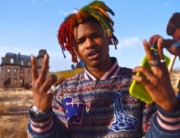From Mickey Rooney in Babes in Arms to Pitch Perfect, American movies have reveled in stories of plucky youths pursuing showbiz dreams with initiative and grit—Hey, kids, let’s put on a show! The Morocco-based Casablanca Beats treads the same ground with its portrayal of working-class young people expressing themselves through rap. In contrast to the U.S. canon’s bubby feel-good mood, the Moroccan entry brings an overcast vibe of unfulfilled hopes and narrow futures. It’s an intriguing twist for a film that incorporates many promising but often underrealized themes.
Handheld documentary-style camerawork and long takes heighten the movie’s sense of realism as the camera moves through Casablanca’s gritty working-class precincts on the trail of its antihero, Anas (Anas Basbousi). The former rapper, a brooding underdog with a hooded charisma, is forced to take a job at a struggling community center where he’ll teach teenagers the ways of hip-hop. At first, he responds to his young charges’ fumbling attempts at rhyme with harsh sarcasm—one story line centers on how this isolated thirtysomething man eventually warms to his students.Another narrative theme is the unhappy predicament of some those in the class. The film looks into a home where a daughter cares for an ill mother and exchanges terse words with an unemployed dad. Another father slaps his son down at the dinner table with a withering remark. However, these intimate moments that add texture and poignancy are dropped and peter out when exploring them further would enrich the movie. Instead, director Nabil Ayouch (Much Loved) highlights in a broader sense how rap music widens the students’ views. The kids boast, protest, and beef like rappers all over the world, but with particular shout-outs to their environment, discussing politics, religion, diversity, and tolerance (sometimes overdirected by a script that include cringeworthy pronouncements such as, “I know some Christians who are good, and they don’t rape anybody.”). The film makes it clear that the Islamic worthies view rap as a threat as individual parents and then an angry group try to crack down on the class. Anas answers these acts of repression with speeches that, again, can seem didactic or stern: “It’s never too late. It’s never too late to change and stop lying to yourself.”Where Casablanca Beats excels is in its naturalistic performances from its young ensemble, ragged but energetic rap forays, and some beautiful, wordless dance performances that showcase youthful strength and sense of possibility in an unforgiving world. The somberness that counterbalances the movie’s exuberance feels oddly welcome. The expressions of joy and rebellion are all the more cherished and hard-fought in such a harsh milieu.







Leave A Comment